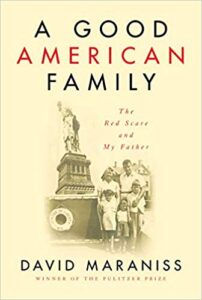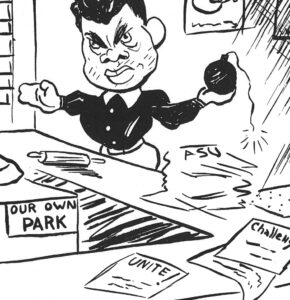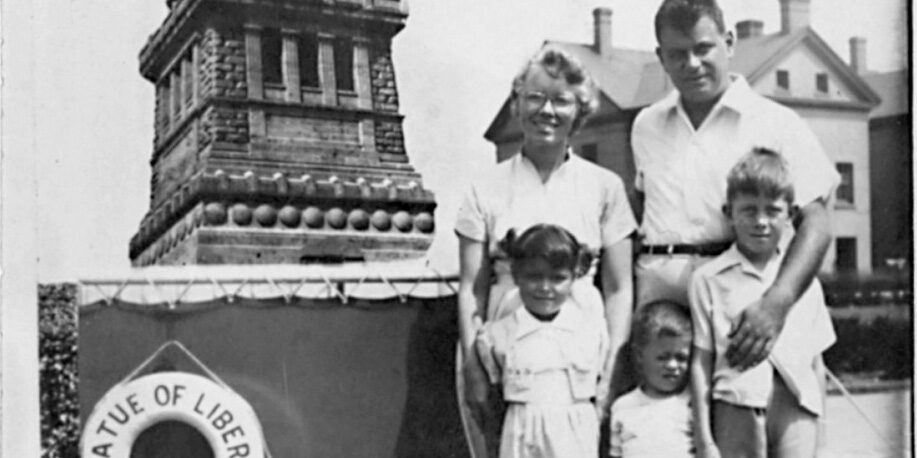A communist on campus
“To hold America in one’s thoughts is like holding a love letter in one’s hand — it has so special a meaning.” — E.B. White
What does it mean to love America?
The journalist-historian David Maraniss, author of bestselling biographies of Bill Clinton, Vince Lombardi, Roberto Clemente, and Barack Obama, had been thinking about the question for years.
It held particular poignancy in his family, even had caused pain and suffering.
Maraniss and his siblings had grown up with the shadowy knowledge that in years long past, their parents — both Michigan graduates — had been publicly damned for their associations with the Communist Party of the United States.
A son’s search
 The Maraniss children knew next to nothing about the details, only that their father, Elliott Maraniss, had lost his newspaper job in Detroit in 1952 when the U.S. House Un-American Activities Committee (HUAC) listed him as a target of their investigations.
The Maraniss children knew next to nothing about the details, only that their father, Elliott Maraniss, had lost his newspaper job in Detroit in 1952 when the U.S. House Un-American Activities Committee (HUAC) listed him as a target of their investigations.
After years on the newspaper industry’s blacklist, the senior Maraniss recovered his good name and enjoyed a distinguished career. He retired in 1983 as editor of the muckraking Capital Times in Madison, Wis. — “a haven for the gifted eccentric,” he once called the newspaper — and died in 2004. His wife, Mary, a book editor at the University of Wisconsin Press, died in 2006.
But they never told their children exactly what had happened to them when they were young, and the children had never quite summoned the courage to ask.
So David Maraniss decided to apply his skills as a biographer to his parents. He had grown up in what he had known to be “a good American family,” to use the title of the book that resulted. Yet his parents had once been called un-American, and he wanted to find out why.
He found many answers, if not all, in the annals of U-M in the late 1930s.
Young leftists
He began with a request for his father’s FBI file. While he waited — for many months — he studied the transcripts of HUAC’s hearings in Detroit in 1952. He also filled in the details of his father’s early years.
Born in 1918, Elliott Maraniss spent his adolescence in Brooklyn during the worst years of the Great Depression. The son of Jewish immigrants, he was an avid Boy Scout who went to Abraham Lincoln High School, an outpost of progressive education. The principal urged students to become engaged, idealistic citizens in a world threatened by fascism, Nazism, and what appeared to be an endless depression.
For progressive students in the mid-’30s, the overriding challenge was to prevent a second plunge into world war. That imperative became entwined with an attraction to Communism, which promised an egalitarian future free of the manifest ills of capitalism, and to faraway Soviet Russia, where the Marxist experiment was being carried out behind curtains of secrecy and propaganda.
Then came the civil war in Spain, with democratic-socialists defending the republican government — and aided by the Soviets — against the fascist rebels of Francisco Franco, who were backed by Nazi Germany.
All these issues permeated the air as Elliott Maraniss enrolled at U-M and joined The Michigan Daily. In time he became director of the editorial page. In dozens of columns, he would lay bare his early thinking for his son to ponder many years later.
Sister and brother

David Maraniss’ uncle, Bob Cummins, went to Spain to fight Franco. (Source: Abraham Lincoln Brigade Archives.)
Maraniss also learned about mother’s early years.
Mary Cummins had grown up in Ann Arbor idolizing an adored older brother, Bob. He was a slightly-built fledgling writer who, at U-M, joined the staff of the Daily a couple years before Elliott Maraniss. At the Daily, a friend recalled, he won admirers by his passionate advocacy for the left and “a strange, amusing personality he exhibited only after too much beer.”
Cummins left the U.S. for Spain, where he joined American progressives fighting alongside republican loyalists against Franco’s fascists. He went with a friend, Ralph Neafus, who would be executed by Franco’s fascists.
Stan Swinton, a Daily editor who would become a foreign correspondent and a leader of the Associated Press, later wrote: “Both Ralph and Bob rather thought they were communists. Neither was sure. But their adherence to the great American bogey [Communism] was a minor matter in influencing their decision. They were fighting for democracy.”
Mary Cummins followed her brother to U-M. She, too, embraced radical ideology. When her brother came home from Spain to a hero’s reception, Elliott Maraniss covered the event as a Daily reporter. There he and Mary met. They fell in love.
“The Daily was his classroom”
At U-M Elliott Maraniss went by the nickname “Ace.” He was a classic “big man on campus,” selected for the honorary societies Sphinx and Michigamua.
He was also well known to be a radical. A cartoon portrait of the Daily‘s leaders published in 1940 in the Gargoyle, U-M’s on-and-off student humor magazine, cast him as a glowering bomb-tosser.
But his intellectual journey was anything but cartoonish. Studying the Daily‘s digital archives, David Maraniss found a young mind engaged in an earnest debate over life-and-death matters.
“I think the Daily was his classroom,” the writer said in an interview. “The faculty was great then, but the Daily was really the heart of what he was learning at Michigan.
“I was floored by the intellectual depth of the Daily in that period. Everything about it was very sophisticated, and you could see a collegial argument going on within the paper that was really extraordinary.”

A January 1940 cartoon in the campus magazine, The Gargyole, cast Maraniss as a glowering bomb-tosser. (Image: Bentley Historical Library. See the entire image.)
In A Good American Family: The Red Scare and My Father, Maraniss writes:
“I accept that I will never know my father’s internal thoughts during that period of his life. I can only work with what he left behind” — some 150 editorials and reviews in the Daily. Distraught over the injustices and horrors of the 20th-century world, he reached for a systematic explanation of what happened and the best way to create something better … his approach alternating between a newspaperman’s keen realism and a romantic idealist’s yearning for perfection. Yet at the core, always, was a deep belief in America and an American ideal.”
At the same time, his son concedes, Elliott turned a blind eye to Joseph Stalin’s brutal rule in the Soviet Union and the “show trials” by which he liquidated enemies and allies alike.
“I have a hard time imagining how he could absorb the facts and still ascribe positive intentions to the Soviet version of communism,” the author writes. “Decades later he broached the subject of his mindset during that period without being specific, describing himself at Michigan as ‘stubborn in my ignorance and aggressive in my prejudices.’ An honest yet gentle self-appraisal.”
His parents on the eve of World War II “loved the promise of America, were disoriented by the economic collapse of the U.S. economy during the Depression, were seeking answers to the chaos of the world, and at the same time wanted to believe in a virtuous, peace-seeking, equality-minded Soviet Union. They thought they were working toward a true and open American democracy even as they were rationalizing the actions of what was, in fact, a ruthlessly totalitarian foreign power. Two opposing ideas, one noble, the other false and naive, coexisted in their minds.”
To love America
A Good American Family goes on to recount Elliott’s service in World War II and the Maranisses’ lives after the war, when they settled in Detroit and started a family. Elliot went to work as an editor at the Detroit Times, owned by the conservative Hearst chain. In their spare time, both he and Mary worked for Communist organizations.When HUAC’s informers put out a list of Detroit-area Communists to be quizzed at a committee hearing — including Elliott Maraniss and his brother-in-law Robert Cummins — the Detroit Times fired Elliott the same day.
At the hearing, HUAC denied Maraniss’ request to read aloud a prepared statement in defense of his refusal to discuss his beliefs with the committee or to name other Communists. But his son found the document in the committee’s files.
Defiant and eloquent, never denying his radicalism, it is Elliott’s testament of what he thought it meant to love America.
“I was taught as a child and in school that the highest responsibility of citizenship is to defend the principles of the U.S. Constitution and to do my part in securing for the American people the blessings of peace, economic well-being, and freedom. I have tried to do just that to the very best of my ability … My Americanism has been questioned and to properly measure a man’s Americanism you must know the whole pattern of a life …
“The U.S. Constitution and its Bill of Rights are not simply musty documents in a library. They have meaning only if they are used … Every newspaperman knows that history is not a printed page. It is the passion and striving, the struggling and endurance of men and women. These qualities that went into the making of our nation can be discarded only at great peril to ourselves and our children.”




Marjorie Korenblit - 1965
The political tone of the UofM has ebbed and flowed over the years. My late brother, M. Richard Fleischman LSA ’50, changed his major from political science to English, after being told by a professor that he would find it hard to get a degree in that department while expressing liberal views, even though he was not a communist.
By the time I arrived, Tom Hayden was the editor of The Daily. From then until I graduated in 1965 I felt it was the literary equivalent of the NY Times or Herald Tribune. The campus was home to liberal views, civil rights supporters, and antiwar activists.
I was shocked to return to Ann Arbor recently to find it home to antisemitism that it managed to avoid, even in the 1920s when my father enrolled because it was one of the few universities known to admit Jews to its medical school. I hope the administration will succeed in its efforts to support real diversity in the current climate that professes inclusion but has forced some Jewish students to avoid being identified as such. I wonder what Elliott Maraniss would say about that.
Reply
Marc Shapiro - 1971
Please expound on your experiencing antisemitism in your recent trip to Ann Arbor.
Reply
Robert Mitchell - 1952
For more on the UofM’s political climate in the very early 1950s, see my “Bramble Bush Without Thorns – – Independent Learning and Learning Independence During Michigan’s Black Silence of Fear, 1948-1952,” LS&A Magazine, University of Michigan College of Literature, Science and Arts, (Spring 1999) 4-8.
Reply
Sarah Hitchcock - 1955
Has anyone written about the year of the
Green Feather Movement that swept the Big 10 while I was in Ann Arbor? We got some few thousand signatures on a petition to get rid of Joe McCarthy, and pinned green chicken feathers on those who were willing. We were a batch of very serious people and someone who was connected to the socialist group on campus in a strange way. I have always resented that the ’50’s were called the quiet, or silent decade of protest. My maiden name was Greek, and I became a Young Dem over these events.
Reply
Henry Lowendorf - 1964
I entered UM in 1960 mildly conservative, yet really apolitical and somewhat cynical. But I would have agreed with Elliott Maraniss’ opening statement to HUAC. I just didn’t know how to apply my sense of citizenship. In my third year I learned from a math grad I knew about the open housing crisis in Ann Arbor at the time. It set me to thinking about the priority of property rights vs. human rights. When I entered graduate school in 1965 the war on Vietnam was heating up as was opposition to it and, as a citizen, I felt my responsibility to choose sides and act accordingly. I went to teach ins, listened to debates, read and agonized. Eventually I chose to resist and in becoming a peace advocate – still to this day – learned far more about how the world works than ever in formal education. I grew to see the United Stated of America, despite all the hope and promise that I along with David’s father absorbed growing up, as the global leader in aggressive wars, violent regime-changes, assassination of foreign leaders and the constant theft of natural and human resources. What I learned back in the 1960s and subsequently outside the classroom was that the U.S. empire didn’t start with Vietnam. Nor did it end there. I am intrigued how common it is written in this country, as does David Maraniss above, about the Soviet Union as “ruthlessly totalitarian.” But the U.S., supposedly a democracy, seen from the perspective of Vietnam over half a century ago, or Indonesia, or more recently for example Iraq and Venezuela, is no less ruthless and vicious than any “totalitarian” state. Calling the U.S. a democracy and its adversaries totalitarian conveniently obscures the former’s major crimes against humanity and the planet. It justifies the assertion that the U.S. is exceptional and above the law. It substitutes for independent thought and analysis of how Elliott Maraniss and many of his contemporaries, some still alive, could look at the Soviet Union and communism through different eyes.
Reply
Robert Vellis - 1977
How do you dare say this? You’re either the typical useful idiot planned by Lenin and after him Gramsci or just plainly dishonest. Much as leftists (like you?) want to get rid of the second amendment, in this country you’re not gonna be hung or put in jail for life for holding the positions that you hold.
Reply
Marcel Hammer - 1998
It’s incredible that a story that should be reason for endless shame is told in this tone of pretended impartiality and, really, nostalgia. I bet communism at UofM is stronger than ever these days. The University of Michigan, Ann Arbor. Spreading cultural cancer to America and the world.
Reply